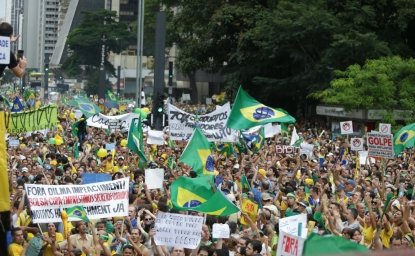Brazilians Rise Against Corruption
Affirming the rule of law in South America’s largest country, a new generation of judges and prosecutors confronts a culture of impunity with strong public support.
Affirming the rule of law in South America’s largest country, a new generation of judges and prosecutors confronts a culture of impunity with strong public support.
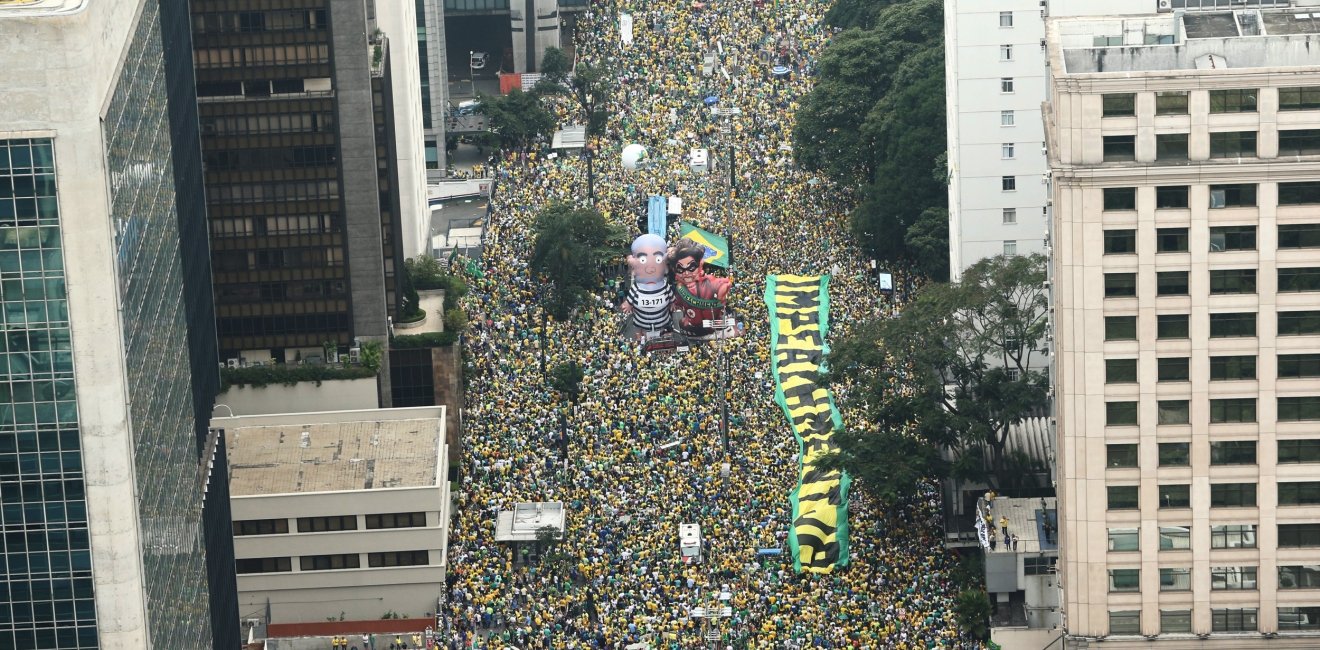
It was perhaps the largest rally against corruption and for democracy under the rule of law ever organized anywhere in the world. On Sunday, March 13, 2016, 3.4 million Brazilians (according to police estimates) took to the streets in 262 cities to protest against a decade-long assault on state oil company Petrobras, perpetrated by the political parties in power and their business associates. The demonstrations were remarkably peaceful and went far beyond their motivation — a call for the impeachment of President Dilma Rousseff. In the words of José Arthur Giannotti, a retired professor of philosophy at the University of São Paulo, “This is extraordinary. The demonstrations were much larger than expected; they went beyond calls to oust Rousseff.” Giannotti noted that the rallies expressed “massive support” for federal judge Sérgio Fernando Moro, who has been leading the investigation on the Petrobras scandal. “People asked for the moralization of Brazilian politics,” Giannotti said.
The streets erupted again in the evening of March 16, after Moro released tapes of telephone conversations between Rousseff and her predecessor, Luiz Inácio Lula da Silva, who is also under federal investigation in the Petrobras scandal. The conversations exposed the Brazilian leader’s direct involvement in what legal experts have described as an attempt to obstruct justice by naming Lula to a cabinet position and taking jurisdiction of the case away from Judge Moro. Under Brazilian law, elected officials and cabinet ministers enjoy certain legal privileges and can be prosecuted only by the Supreme Court.
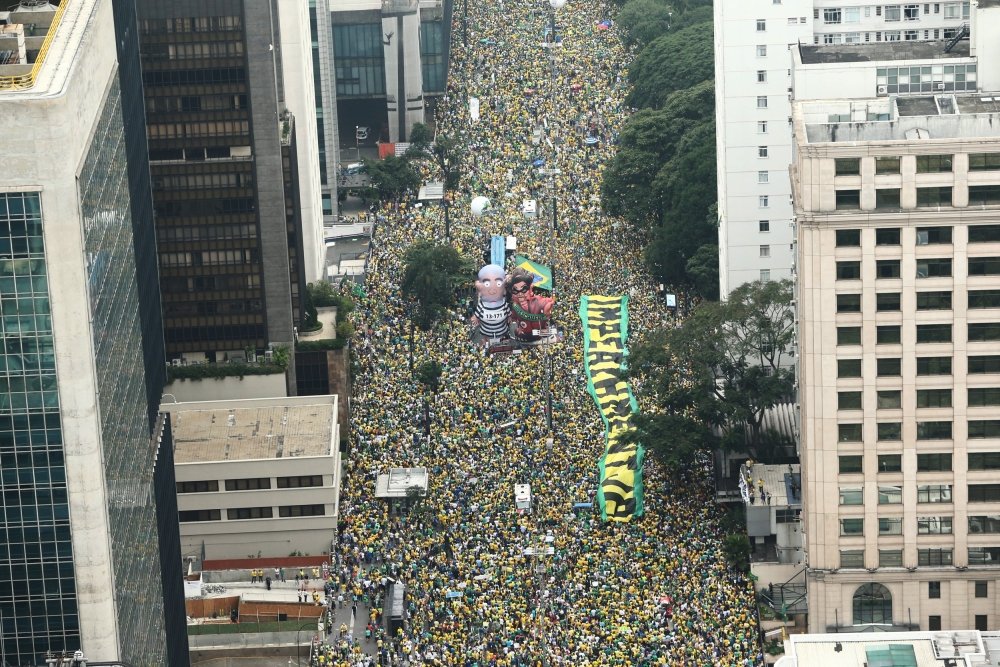
Rousseff’s Impeachment Could Lead to Her Removal from Office before the Rio Olympics
Although controversial, the release of the incriminating dialogue involving a sitting president was supported by Brazil’s Association of Federal Judges as constitutional. The following morning, moments after Lula took office as the government’s chief minister in a raucous ceremony in the presidential palace, a federal judge in Brasília who has been openly critical of the Rousseff government issued a preliminary injunction blocking the former president’s nomination. The injunction was lifted but, by the end of the week, Lula’s nomination to Rousseff’s cabinet was suspended by one of the 11 members of the Supreme Court as an act of obstruction of justice. The plenum of the court is expected to review the ruling at the end of the month, but is unlikely to reverse it. An estimated 300,000 people gathered on Friday, March 18, in São Paulo and other major cities to voice their support for President Rousseff. The rallies did not change the dynamic of the crisis.
On April 17, after a raucous six-hour-long session, 70 percent of the 513 members of the Chamber of Deputies voted to impeach Rousseff for misrepresenting government expenditures not authorized by Congress, in violation of two federal laws. According to figures released by the Central Bank of Brazil, in 2015 these expenditures amounted to 1 percent of the country’s GDP. In U.S. terms, it would be as if the government of President Barack Obama had spent $181 billion not appropriated by Congress.
These developments added to the deep crisis of confidence in a country divided over its ethically challenged politicians, but did not derail the impeachment process or the prospects of Rousseff’s removal from office by the Senate, which could occur as early as late July.
In the first week of May, Brazil’s attorney general Rodrigo Janot asked the Supreme Court’s permission to investigate Rousseff and Lula for attempting to obstruct justice in the episode of his nomination to her cabinet. On May 5, responding to a previous request by Janot, the Supreme Court issued a unanimous decision suspending the Speaker of the House, Eduardo Cunha, from his functions. The justices ruled that Cunha, a powerful politician who had orchestrated Rousseff’s impeachment but himself faces multiples charges of corruption in the Petrobras scandal, could not remain in the line of presidential succession while under criminal indictment. In the same week, Vice President Michel Temer, who was slated to replace Rousseff as acting president in mid-May, once the Senate reviews the impeachment and votes to hold a trial, was himself ordered by a regional electoral court to pay a fine for violating campaign financing limits.
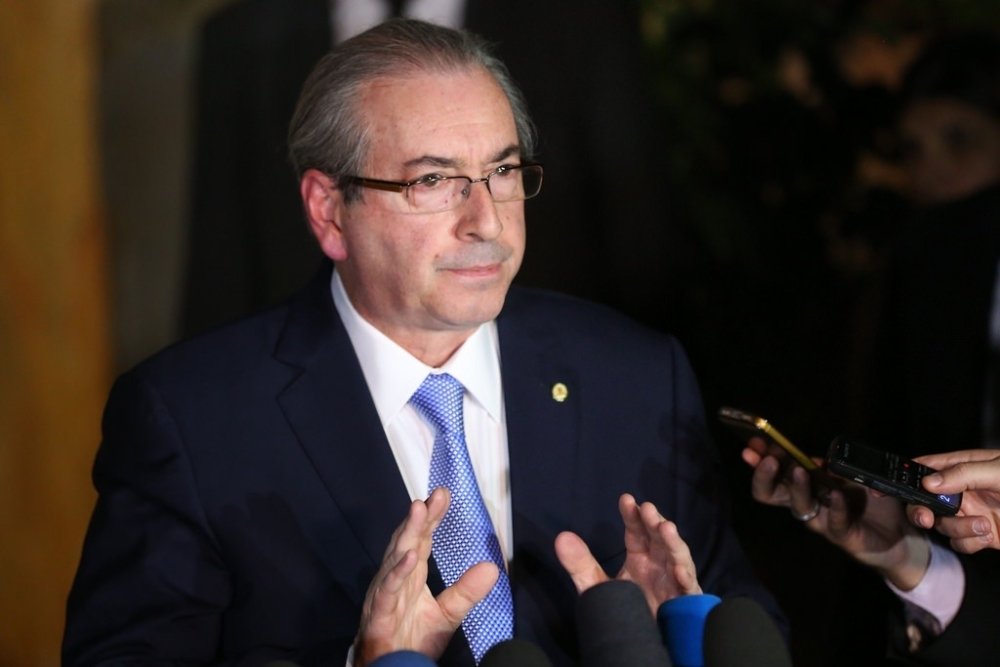
These developments added to the deep crisis of confidence in a country divided over its ethically challenged politicians, but did not derail the impeachment process or the prospects of Rousseff’s removal from office by the Senate, which could occur as early as late July, before the opening of the Rio Olympics in August. Opinion surveys released by Brazilian media at regular intervals continue to show strong support for Rousseff’s impeachment, at around two-thirds of the voters. One poll showed 57 percent saying that they would not vote for Lula for president, a jump of 10 points since November 2015. The same poll showed Marina Silva — a founding member of Lula’s Working Party, former senator, and former minister of the environment, who broke ranks with Lula — as the only national politician gaining public support. With new elections scheduled for October 2018, Vice President Temer was hard at work in early May to put together a cabinet capable of gaining voters’ and investors’ confidence and containing the free fall of the Brazilian economy — the world’s seventh largest. A Temer government will have to perform well and show results to solve the obvious problem of political legitimacy revealed by the crisis. Failure to do so inevitably would create pressures to call for early elections.
These events and calculations were the culmination of weeks of mounting tension that included the detention for questioning of Lula, on Judge Moro’s orders, on March 4. Lula, Rousseff’s mentor and a once-revered leader who had left the presidency in 2010 with an 84 percent approval rating, recently had maneuvered to avoid facing São Paulo state prosecutors who were conducting a similar inquiry on posh real estate property connected to his family, close friends, and companies involved in the Petrobras scandal. According to an opinion poll released on March 11 — two days before the initial rallies — at a forum convened by the Wilson Center’s Brazil Institute, a majority of Brazilians agreed with the federal action.
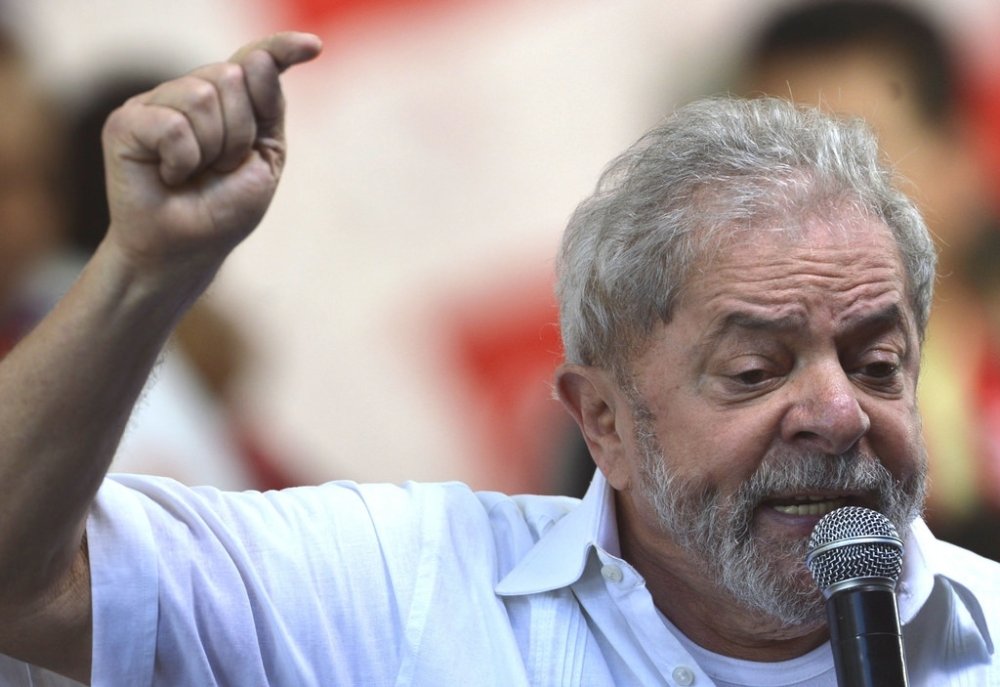
Even so, the episode caused quite a commotion in a country notorious — until recently — for the impunity enjoyed by people in high places. The fuss intensified a few days later after the state prosecutors charged Lula with money laundering and hiding ownership of a luxury beach apartment. In a move seen as excessive even by opponents of the former leader, the prosecutors asked a judge to issue an arrest order against the former president, his wife, his oldest son, and others involved in the case.
As illustrated by the massive street protests of March 13, Brazilians’ tolerance for corruption has been dramatically reduced.
The decision reflected a sea change of attitude regarding ethics in public affairs in a country where a famous populist governor of the state of São Paulo became a national legend in the 1950s as a politician who “steals but get things done.” Corruption was viewed as part of the genetic code of a backward society built on inequality and oppression, controlled by a tiny elite. Occasionally, a few egregious cases of corruption were prosecuted, but after lengthy court proceedings cluttered by procedural appeals they had meaningless outcomes and entailed no punishment, exhibiting the unwritten principle captured in a popular saying: “For friends, everything; for enemies, the law.”
A Slew of Convictions Against a Deeply Flawed Political Class
As illustrated by the massive street protests of March 13, Brazilians’ tolerance for corruption has been dramatically reduced. As of the end of February 2016, 84 notable politicians, business executives, and associates had been convicted in federal courts of embezzlement of public funds, conspiracy, and money laundering, and had served or were serving hard time. The crimes in most cases were related to bribes paid over a decade in contracts between state oil giant Petrobras and is suppliers. The onslaught cost the company an estimated $3 billion and the evaporation of most of its peak market value of $330 billion in 2011, which was compounded by the fall of international oil prices. Among the convicted are the chief executive officers and senior executives of Brazil’s largest construction firms, such as Odebrecht, UTC, OAS, and Andrade Gutierrez, once considered beyond the reach of the law. Shady political operators and former senior managers of Petrobras who had gotten their jobs thanks to connections to the leadership of three key parties of the country’s governing coalition are also serving time or under house arrest for fraud, money laundering, and conspiracy.
No fewer than 38 members of Congress, among them the speaker of the Chamber of Deputies and the president of the Senate, also have been targeted for criminal investigation. Lula himself faces questions about the regular use by his family, since he left the presidency, of a country house in the mountains near São Paulo that was renovated by two of the construction companies under criminal investigation in the Petrobras case. In a separate inquiry, the former president and his wife face questions about the ownership, which they denied, of a luxurious triplex apartment at a São Paulo beach resort finished and furnished by one of the construction firms caught in the Petrobras case. The property, which the couple had visited, remains empty. Complicating matters, in late February, the chief campaign adviser for both Lula and his successor, President Dilma Rousseff, was arrested on charges of receiving millions of dollars in unreported income from political campaign work done in half-a-dozen countries whose governments had ties to the Workers’ Party and Brazilian construction companies.
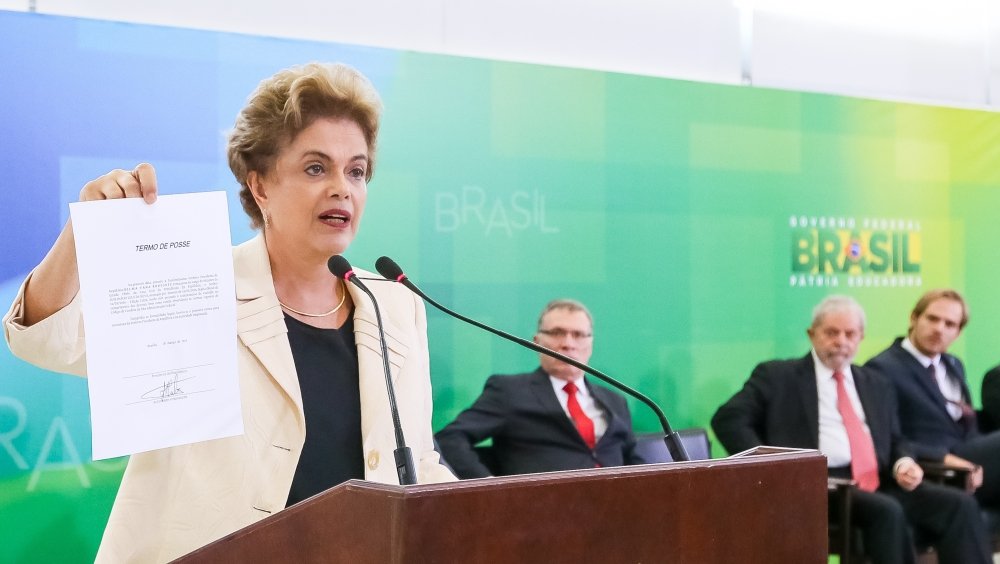
Restoration of Democracy and a New Generation of Officials
The law enforcement offensive is being led by a new generation of federal judges, prosecutors, and police officials who grew up in the environment of political freedom and democracy reinstated in Brazil in 1985 following two decades of military rule. Most are well educated and well paid. Many have studied abroad. Their actions are anchored in the constitution adopted in 1988 and in judicial reforms that began in 2004 with the creation of institutions of external control of the judiciary branch of government. “Three decades of democratic rule in Brazil have produced meaningful institutional progress toward establishing a universal and effective rule of law in South America’s largest nation,” said Matthew Taylor, associate professor of political science at American University, at a conference held at the Wilson Center in May 2015. “The formal institutions of the judicial system have been improved significantly through a series of reforms to the legal structure, changes in procedural rules, and improvements in staffing and administration. The courts have addressed rising citizen demands by improving their efficiency, even as they simultaneously expanded access. Although important challenges remain, the judicial system has narrowed the gap between demands for justice and the provision of rights, contributing to improved social justice, enhanced development outcomes, and the deepening of democracy in the country.” The offensive to clean up the system is also reflected in a new culture of compliance taking root in a private sector that suddenly has become aware of the need to follow the rule of law in its dealings.
Prosecution of corrupt politicians started a decade ago. In 2005, a federal representative allied to the Lula government revealed that higher-ups in his administration had set up a scheme to buy votes in Congress by paying its members fat monthly stipends to ensure their loyalty. It took seven years to investigate the “Mensalão” (monthly allowance), as the case was dubbed. In 2012, it finally reached the Supreme Court, which has jurisdiction over criminal cases involving federal elected officials and cabinet members. The trial was presided over by Justice Joaquim Barbosa, the first and only black judge ever to sit on the highest court in the country that has the world’s second-largest population of African heritage (after Nigeria). The trial was televised live for weeks to a mesmerized nation. Twenty-five defendants were convicted. Twelve of them — including the chief minister of Lula’s cabinet, the president and the treasurer of his Workers’ Party, and the speaker of the House — were sentenced to prison terms.
From Mensalão to “Petrolão”
Sérgio Fernando Moro, a 44-year-old federal judge from the southern state of Paraná who assisted the Supreme Court in the Mensalão trial, would emerge as a key actor in the Petrobras case. Working on knowledge gained in the Mensalão investigations, in March 2014 Moro and a team of prosecutors launched an inquiry into suspiciously large money transactions detected at a car wash (lava jato) in Brasília. By then, the Brazilian judicial system had gained muscle. Under pressure from major street protests that shook the nation in mid-2013, Congress had passed a law expanding the latitude of prosecutors to negotiate American-style plea bargain deals with willing defendants. At the end of 2015, 49 of these defendants had signed agreements to reveal what they knew in exchange for reduced sentences.
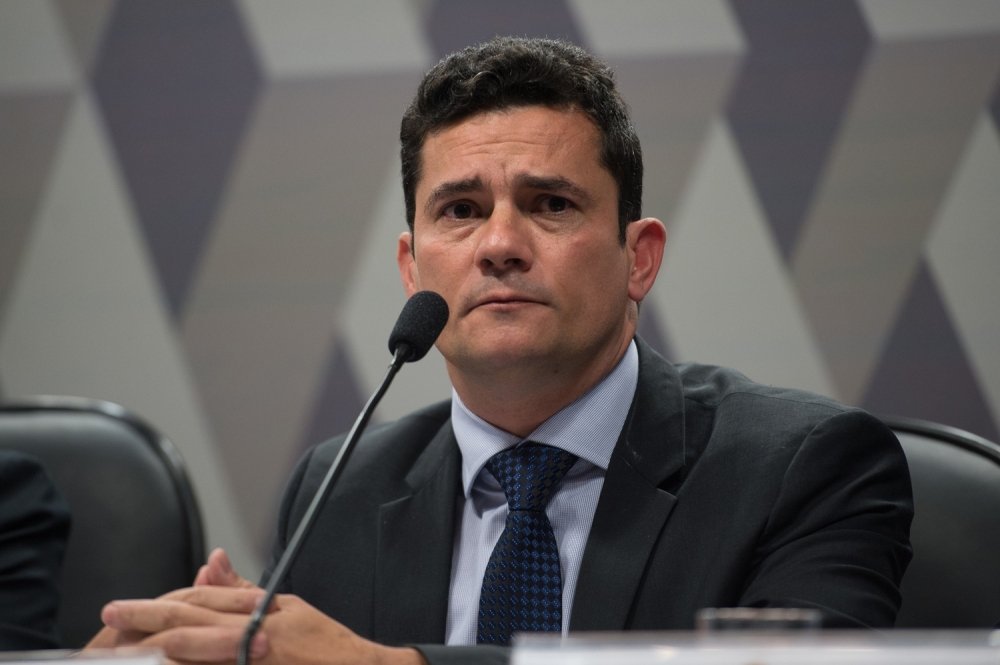
The information gathered from the plea bargains allowed prosecutors to piece together and expose a massive conspiracy — soon known as “Petrolão” — that had been carried out over a decade to defraud Petrobras, Brazil’s largest company. More than 230 persons and 16 companies were investigated. International cooperation between Brazilian prosecutors and colleagues in the United States, Switzerland, the Netherlands, Italy, and other countries was key to the outcome. The U.S. Securities and Exchange Commission and the Justice Department told Petrobras in early 2015 that the company was under investigation for possible violation of American securities laws and the Foreign Corrupt Practices Act (FCPA). In September 2015, Patrick Stokes, the head of the U.S. Justice Department’s FCPA unit, spent four days in meetings with Moro and members of the “Lava Jato” task force. Tired of dealing with the ingrained culture of corruption and bureaucracy that their businesses face to operate in Brazil, senior executives of local foreign subsidiaries say they applaud the investigations.
Asked whether they would support the suspension of the anticorruption investigations if doing so helped to improve Brazil’s economic situation, 88 percent said no.
The Lava Jato operation has not been free of criticism. The imprisonment in November 2015 of investment banker André Esteves on obstruction-of-justice charges proved to be rushed and was changed to house arrest. In mid-January, 105 lawyers representing dozens of defendants published a manifesto in Brazilian newspapers protesting against the conduct of Moro and prosecutors. They compared the investigations to “the Inquisition” and accused the judge and prosecutors of violating their clients’ presumption of innocence and right to due process. The sharpest criticism was against Moro himself, for allegedly abusing the power to imprison defendants temporarily in order to force them to sign plea agreements.
Moro reacted to the attacks on the detention of the former president by stating, in a note, that the action was carried out “only to clarify the truth and does not mean anticipation of guilt.” The Lava Jato prosecutors said that 117 similar actions had been executed previously “without criticism.” Reminding the country that Lula is not above the law, they added that the former president “deserves respect in the exact measure that is owed to any other citizen.”
The earlier protest by the Lava Jato defendants’ lawyers was countered by associations of federal judges and prosecutors, who stated that Moro and colleagues had acted under the supervision of the Supreme Court. The chief federal prosecutor’s office clarified that of the 413 motions to superior courts appealing Judge Moro’s decisions, only 16, or less than 4 percent, were accepted and found to have some merit. Federal prosecutor Carlos Fernando dos Santos Lima added that up to 80 percent of the Lava Jato defendants who cooperated with the investigations had signed plea agreements without going to jail. The lawyers’ uproar quickly died down. Less than a month later, Brazil’s Supreme Court added teeth to the fight against corruption. In a decision that is bound to remain contentious, it ruled that convicted criminals should be remanded to prison after losing the first appeal. Previously, those convicted were allowed to remain free until the end of the appeals process, which can take years. The Supreme Court’s decision “closes one of the windows of impunity in Brazil’s penal process,” said Moro, who had advocated for the change.
Widespread Public Support
Actions by Moro and colleagues in the Federal Judiciary and the Public Prosecutor office in the Lava Jato operation and other investigations on corruption launched since then have gained ample public support. According to opinion surveys carried out in September 2015 and in January and March 2016 by Ideia Inteligência, a São Paulo polling firm, two-thirds of Brazilians disagree with official statements blaming Lava Jato for the country’s ongoing crisis and 9 in 10 Brazilians support the Lava Jato operation despite its negative impact on the country’s economy, which is in a deep recession. Asked whether they would support the suspension of the anticorruption investigations if doing so helped to improve Brazil’s economic situation, 88 percent said no. Majorities also supported Lula’s detention and questioning by federal authorities, and believe that he was involved in criminal activities.
These numbers suggest that a change of attitude toward corruption is under way in Brazil. It may be too early to call it a cultural change. But the passivity that was once expected of law enforcement officials in the face of revelations of wrongdoing is a thing of the past. Gradually, it is being replaced by the new disposition of judges, prosecutors, and the federal police to assert the rule of law. This shift was illustrated in a remark made by Leandro Daiello, the head of the Federal Police, during a newspaper interview in September 2015. Asked to comment on former president Lula’s complaint that the Ministry of Justice had lost control of Brazil’s federal police force, Daiello explained that even though the Federal Police is under the administrative jurisdiction of the Ministry of Justice, “The Federal Police is controlled by the law.” The reporter insisted that federal agents were acting in ways that would end up in investigations of President Lula and other former and current authorities. “We investigate facts, not people,” Daiello replied. “Where those facts take us is a consequence of the investigation itself, as painful as it may be.”
The opinions here are solely those of the author.
An award-winning journalist, Paulo Sotero was a correspondent for major Brazilian newspapers in Brazil, Europe, and the United States before he joined the Wilson Center as director of its Brazil Institute. He is a frequent lecturer and contributor to newspapers and journals, and holds a master’s degree in journalism from American University.


The Brazil Institute—the only country-specific policy institution focused on Brazil in Washington—aims to deepen understanding of Brazil’s complex landscape and strengthen relations between Brazilian and US institutions across all sectors. Read more

